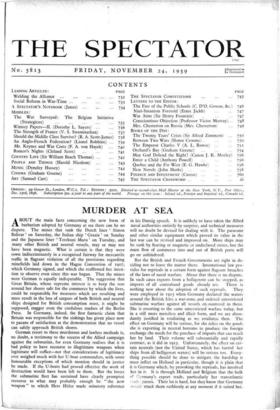MURDER AT SEA
ABOUT the main facts concerning the new form of barbarism adopted by Germany at sea there can be no dispute. The mines that sank the Dutch liner Simon Bolivar' on Saturday, the Italian ship Grazia ' on Sunday and the Japanese liner Terekuni Maru ' on Tuesday, and many other British and neutral vessels, may or may not have been magnetic. What is certain is that they were sown indiscriminately in a recognised fairway for mercantile traffic in flagrant violation of all the provisions regarding minefields laid down in the Hague Convention of 1907, which Germany signed, and which she reaffirmed her inten- tion to observe even since this war began. That the mines were German is equally indisputable. The suggestion that Great Britain, whose supreme interest is to keep the seas around her shores safe for the commerce by which she lives, could be responsible for measures which are resulting and must result in the loss of cargoes of both British and neutral ships designed for British consumption must, it might be supposed, stagger even the credulous readers of the Berlin Press. In Germany, indeed, the first fantastic claim that Britain was responsible for the sinkings has given place now to paeans of satisfaction at the demonstration that no vessel can safely approach British shores.
German resort to these murderous and lawless methods is, no doubt, a testimony to the success of the Allied campaign against the submarine, for even Germany realises that it is bad policy to have recourse to illegitimate weapons when legitimate will suffice—not that considerations of legitimacy ever weighed much with her U-boat commanders, with some honourable exceptions of which mention should in justice be made. If the U-boats had proved effective the work of destruction would have been left to them. But the losses the submarine fleet has sustained have clearly prompted recourse to what may probably enough be " the new weapon " to which Herr Hitler made minatory reference in his Danzig speech. It is unlikely to have taken the Allied naval authorities entirely by surprise, and technical measures will no doubt be devised for dealing with it. The paravane and other similar equipment which proved its value in the last war can be revived and improved on. More ships may be sunk by floating or magnetic or undeclared mines, but the main flow of commerce into and out of British ports will go on unhindered.
But the British and French Governments are right in de- ciding not to leave the matter there. International law pro- vides for reprisals in a certain form against flagrant breaches of the laws of naval warfare. About that there is no dispute. In such cases exports from a belligerent can be stopped, as imports of all contraband goods already are. There is nothing new about the adoption of such reprisals. They were employed in 1915 when Germany declared the waters around the British Isles a war-zone, and ordered unrestricted submarine warfare against all vessels en.:ountered in them. She is resorting to the same unrestricted warfare today, but in a still more merciless and illicit form, and we are abun- dantly justified in retaliating as we retaliated then. The effect on Germany will be serious, for she relies on the goods she is exporting in neutral bottoms to produce the foreign exchange she needs for the purchase of imports that can reach her by land. Their volume will substantially and rapidly contract, as it did in 1915. Unfortunately, the effect on cer- tain neutrals (not the United States, which has barred her ships from all belligerent waters) will be serious too. Every- thing possible should be done to mitigate the hardship it must inflict on Holland in particular, though it is plain that it is Germany which, by provoking the reprisals, has involved her in it. It is through Holland and Belgium that the bulk of Germany's export trade, particularly her transatlantic rade, passes. Their lot is hard, but they know that Germany would attack them ruthlessly at any moment if it suited her.




































